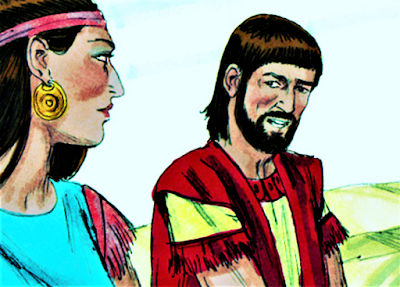Go Deeper: The Angel and Mary
The beginning of the Gospel of Luke (chapter 1:1-7a), folio 102 in Minuscule 481,
made in 10th century.
Our preschoolers are learning that Jesus is God’s Son. In our Bible story "The Angel and Mary," Mary heard the amazing news that God was giving us all a very special gift, His very own Son, Jesus. And here, we go deeper. Let's dive in!
First, look at this manuscript. It is the beginning of the Gospel of Luke. This particular copy was written in the 10th century. Now, onward.
In the introduction to the gospel, the writer states that they carefully investigated the events and they are giving an orderly account so the reader may be certain of the things they have been taught. This same writer also prepared the Acts of the Apostles for the same reason. But who is the writer? Based on Paul’s references in his letters to the churches, and the writer’s references to themselves in Acts, the early church understood the writer of both to be Luke, the physician who accompanied the Apostle Paul on several of his missionary journeys (Acts 16:10–17; 20:5–15; 21:1–18; 27:1–37; 28:1-16; Colossians 4:10-11, 14, 2 Timothy 4:11, Philemon 24).
What about the reader? Who were they? Biblical scholars believe it to be a prominent official of the time who was a believer. Some suggest the name given for the reader, “most excellent Theophilus,” was more a descriptor than a name. Theophilus can mean "friend of God," "beloved of God," or "lover of God." And some have noted that this same descriptor can apply to all who believe (Luke 1:1-4; Acts 1:1-5).
When Herod the Great, was King of Judea, one member of the priesthood was a man from the hill country of Judah named Zechariah. His wife was Elizabeth. Although they both wanted children, they had none. And both were advanced in years. One day, while Zechariah was on duty in the temple at Jerusalem, the angel Gabriel appeared and told him, "Good news!" Elizabeth would bear a son, to be named John. He would be filled with the Holy Spirit and he would turn the hearts of the people back to God, preparing the way for the Lord. But Zechariah questioned how this was possible, because both he and Elizabeth were advanced in age. So, Gabriel told doubting Zechariah he would be silent until the events came to pass. Some time after Zechariah returned home, Elizabeth became pregnant (Luke 1:5-25).
In the sixth month of Elizabeth’s pregnancy, God sent Gabriel to the town of Nazareth, in Galilee. He visited Mary, a young woman pledged to marry Joseph, who was a descendant of King David. Gabriel told Mary God had found favor with her. Through the power of the Holy Spirit, Mary would bear a son and she would call him Jesus. He would be called the Son of the Most High—the Son of God. He would have the throne of his ancestor David. And His kingdom would never end. Mary responded to Gabriel, “I am the Lord’s servant. May it happen to me according to your word” (Luke 1:26-38).
After Gabriel left, Mary hurried to the hill country of Judah, to the home of Elizabeth and Zechariah. When Mary greeted her, the baby leaped in Elizabeth’s womb, and she was filled with the Holy Spirit (Luke 1:39-45).
In response to Elizabeth’s greeting, Mary lifted a song, which began, “My soul magnifies the Lord, and my spirit rejoices in God my Savior!” Mary’s song is considered one of the canticles in the Bible. A canticle is a passage of text which is often used in praise or worship of God. When used as a canticle, the passage is often called "The Magnificat." The word "magnificat" is Latin, meaning “to magnify.” Mary stayed with Elizabeth for about three months and then returned to her home in Nazareth (Luke 1:46-56).
Soon after Mary’s departure, Elizabeth’s son was born. When it came time to name the child, people wanted to name him Zechariah, after his father. But Elizabeth told them he should be called John. When they questioned why, Zechariah wrote on a tablet, “His name is John.” Immediately Zechariah’s mouth was opened, and he praised God. Zechariah began, “Blessed be the Lord, the God of Israel, because He has visited and redeemed His people.” Zechariah’s song is another of the canticles in the Bible. And so, the boy John grew and became strong in spirt; and he lived in the wilderness until the time of his public appearance to Israel, as he prepared the way for the Lord—Jesus, God’s Son (Luke 1:57-80).
-
The story illustration is in the Public Domain.
-




Comments
Post a Comment